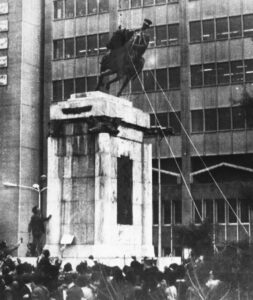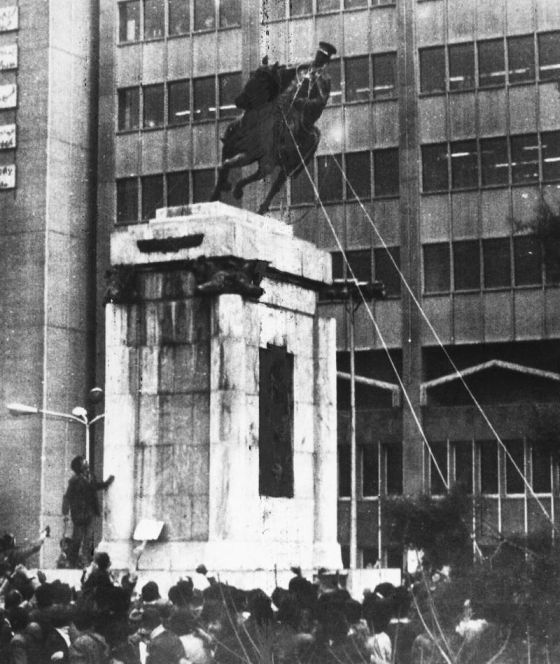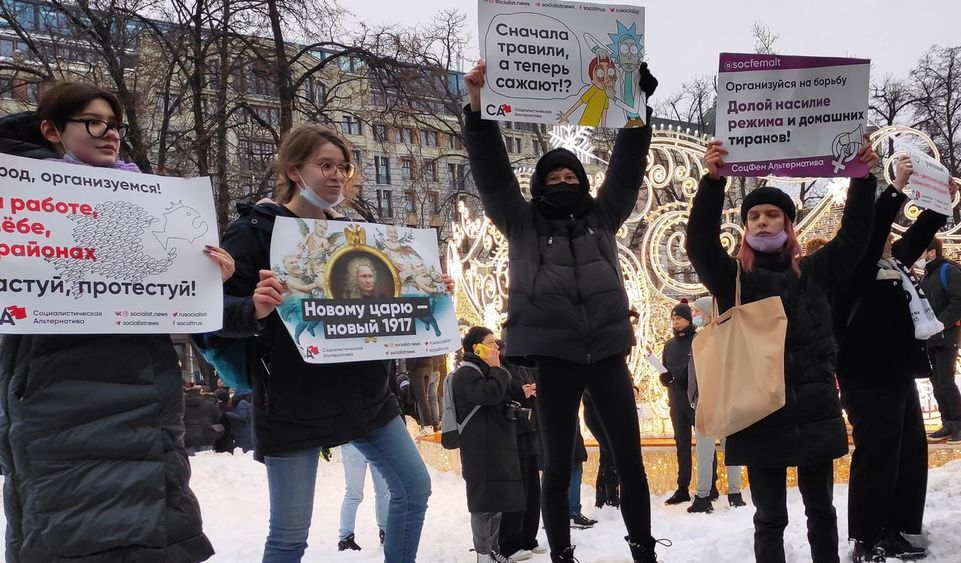
How can the workers achieve power?
Following the overthrow of the Shah in February 1979, a supporter of Militant, the forerunner of the Socialist Party, travelled to Iran. In a number of subsequent articles the revolution’s development and the issues facing the workers’ movement then – and still relevant today – were addressed. We reprint extracts from an article from the 6 April 1979 edition of Militant (No.450) which discussed the policies of different parties and groups on the Iranian left. Breaks from the original text are indicated by ellipsis.
The two months after the overthrow of the Shah have made it plain that the Iranian masses saw the Pahlavi monarchy’s downfall as only a stage on the road to national and social liberation…
Workers have not only been fighting for purely economic demands. Many workers, in particular the oil workers in Abadan and tractor workers in Tabriz, have been calling for the sacking of the old bosses and the right to elect managers themselves. Workers at the General Heating and Ventilation factory in Tehran have been given permission by the government to run their factory themselves after the old bosses had fled. At the same time, a struggle has been developing for full trade union rights and the dismissal of the old ‘workers’ representatives’ appointed by the SAVAK [the Shah’s secret police].
Already some of these developments have run into opposition from Khomeini’s Revolutionary Islamic Committees and their militia. In Tabriz a workers’ demonstration was harassed by militiamen who called the workers ‘communists’ or ‘SAVAK agents’ and fired shots in the air. A workers’ meeting called after this in Tabriz reported that the bosses now tried to suppress workers by labelling them ‘communists’ and that workers who tried to form unions, committees or other organisations had been hampered.
Khomeini has continually attacked communist and socialist ideas as ‘un-Islamic’ and said “Marxists are at war with Islam”. His supporters are continually attempting to whip up a nationalist frenzy against the left under the slogan of ‘Opposition to Imperialism, Zionism and Communism’. Nevertheless, such is the pressure of the workers and masses that even Khomeini has been forced to make demagogic attacks on the rich and grant concessions, such as the cancellation of the water and electricity bills of poor people for the last six months of the old regime…
Already workers are beginning to draw conclusions from their own experiences in the revolution. A workers’ representative speaking to a big rally in Tehran at the end of February explained that “the very foundation of our society was based on the activities of the working class. Look around you, everything in this country has been created by us and should we withdraw our labour power then everything would cease to exist. After all, it was us, the workers, who took arms and invaded the army barracks. Do you know of any employer or lawyer who attacked the barracks?”
One of the main reasons for the absence, so far, of the development of an independent working-class movement has been the lack of any clear leadership.
The Tudeh (Masses) Party, which in practice is the pro-Moscow ‘Communist’ Party, had a mass basis in the 1940s but its links with Stalinist Russia and its failure to lead a vigorous struggle against the Shah have limited its appeal. Now, in an attempt to build support by hanging onto Khomeini’s coat-tails, the Tudeh has issued an appeal for a ‘United Popular Front’ which would “combine the strength of the supporters of Ayatollah Khomeini, of the Tudeh and other revolutionary parties”.
No criticism is made against Khomeini. Noureddin Kianouri, a Tudeh leader, said just before the insurrection that, “the Ayatollah deserves the esteem of the whole Iranian revolution and has earned himself the title of leader of the political and religious opposition. The Tudeh Party fully backs his initiatives”. He added that the Tudeh supported Khomeini’s plans for a referendum to establish an Islamic republic.
Similarly, the fairly sizable ‘Marxist’ guerrilla group, the Fedayeen-e Khalq, have stressed time and again their support for “progressive religious leaders like Ayatollah Khomeini and Ayatollah Taleghani”, and their opposition to attempts to “create disunity among the progressive forces of the country”…
No alliance with Bazargan or Khomeini
These groups do not openly take up an independent working-class position, and fail to explain the necessity for the working class to take power if the gains of the revolution are to be consolidated and extended. Only the socialist transformation of society can provide both a guarantee against reaction and lead to a solution of the crisis gripping Iran in the working people’s interests.
A policy of seeking to mobilise support for a socialist revolution would mean explaining to the working class that it is necessary to have no confidence in either the Mehdi Bazargan government [the first after the revolution] or Khomeini. They must rely only on their own power and solidarity which already has toppled the Shah. They should build, extend and link up their own organisations, particularly democratic workers’ and soldiers’ revolutionary committees, against the unelected, self-appointed Revolutionary Islamic Committees.
The Tudeh leaders, apart from continual calls for an alliance with Khomeini, have up to now restricted their demands to vague calls for “a government which would recover the plundered wealth of the country”. There have been no socialist policies advanced or any criticism of Khomeini. A call was made for a ‘national democratic regime’ but this now has been played down and the Tudeh is supporting an Islamic republic.
The only occasion when the Tudeh has been prepared to take an independent stand was a call in the middle of February for all the guerrilla groups to keep their weapons “until all vestiges of imperialism, colonialism, despotism and counter-revolution have been destroyed”. But the socialist programme necessary to destroy these dangers was not put forward.
The Fedayeen, while still praising Khomeini and offering to co-operate with the Central Revolutionary Islamic Committee on arms control, have put forward a more independent programme than the Tudeh. Their main call has been for the election of democratic committees in factories, businesses, government offices and military bases. Alongside this has been the demand for the disbandment of the old army and the creation of a ‘people’s army’ with elected officers. While calling for a “true and democratic land reform”, cancellation of all farmers’ debts and handing over of big farming enterprises to their workers, they do not put forward socialist demands for the rest of the economy.
The Fedayeen have stressed the “unity of all forces fighting for democracy and progress… and expected all popular and patriotic forces to co-operate in the struggle for democratic liberties and against the exploitation of man by man”. This striving for unity irrespective of clashing class interests was best illustrated in the Fedayeen’s March 11 appeal to the Bazargan government to “swiftly control the present situation” to prevent Iran being “plunged into an unwanted civil war”.
In a letter to Bazargan’s government the Fedayeen asked it to make use of “all political organisations in the country so as to be better able to fulfil its obligations”. This was a repeat of the Fedayeen’s earlier demand for a place in the government!…
The failure to understand the nature and role of imperialism as something intimately tied up with the existence of capitalism in Iran leads to the position where the Tudeh, Fedayeen, Mojahedin and the NDF [National Democratic Front] support, to varying degrees, Bazargan, the representative of the Iranian capitalist class. This politically totally disarms the working class. Bazargan is attempting to defend the continued existence of capitalism in Iran by holding back the further development of the revolution. This has to be made clear to the masses…
An independent working-class position
The key question facing the Iranian working class is the struggle for a socialist Iran, both to solve the social crisis and to strip the ruling class of their power and ability to later impose a new dictatorship. But this will not be achieved in co-operation with the Bazargan government; it can only occur through the overthrow of the capitalist government. Socialists in Iran must explain this, first to advanced sections of the working class and then, through them, to the mass of the class.
Similarly, Khomeini’s position must be undermined by exposing his reactionary attempts to limit the gains of the revolution and explaining the utopianism of his populist demands…
All the major problems in Iran remain to be solved. The widespread support for the creation of an ‘Islamic Republic’ (which would still be capitalist) will not answer any of these problems. It does not show the mass of Iranians how living standards can be raised and how the masses’ democratic rights can be secured. The ‘Islamic Republic’ means all things to all men…
The task of Marxists now is to explain the processes which are taking place, to show the inadequacies of the programs which are being advanced and argue for independent working-class policies, based on the need for the organisation of the working-class movement; the election of democratic committees in every workplace and military unit, and the linking together of these committees on a district, regional and national level.
These committees would have to launch a determined struggle for the people’s immediate needs – such as democratic rights, a 40-hour week, a higher minimum wage, a crash housing plan, the control of prices, the right to self-determination and autonomy for the national minorities. All this would be linked to the necessity of an independent workers’ government which would nationalise the major industries, take over the property of the 22 families which control Iran, and draw up a socialist plan of production…
All that is preventing the rapid overthrow of capitalism in Iran is the absence of an independent workers’ party campaigning on such a Marxist programme. But in the course of the unfolding of the revolution the ideas of Marxism can get a wider and wider response. This can lead to the development of such a party capable of guiding the Iranian workers and peasants to a democratic socialist Iran, which would be an inspiration to working people throughout the world.
Left wing groups
As the Khomeini regime tightened its grip, helped by the 1980 outbreak of the war with Iraq, left-wing organisations were suppressed. Many split over the question of whether it was correct to give any form of support to Khomeini.
The Fedayeen-e Khalq split in June 1980 into Fedayeen Majority and Fedayeen Minority. The minority rejected the majority’s position, similar to that of the Tudeh, that the Khomeini regime was anti-imperialist and so should be critically supported. Despite persecution, the Fedayeen Majority followed this line until a heavy wave of repression was launched against it in early 1983.
The Tudeh Party attempted to work with the Khomeini regime, supporting its suppression of other left groups, until increasing repression in 1982 led to a heavy crackdown on the Tudeh in early 1983. This included the arrest of over 10,000 members and supporters.
The Mojahedin-e Khalq was a radical grouping which combined left-wing and Islamic ideas. It moved from supporting Khomeini in early 1979 to launching terror attacks against the Islamic regime in 1981. While having some support immediately after the revolution, it lost much support when it sided with Saddam Hussein in the 1980-88 Iran-Iraq war. In recent years, under the banner of the National Council of Resistance, it has worked closely with the US Republicans and similar forces.
The National Democratic Front was a short-lived centre-left organisation which was critical of both the Bazargan government and Khomeini. Launched in March 1979, at a million-strong rally marking the anniversary of Mohammad Mossadegh’s death, it was quickly subjected to attack and soon banned.



